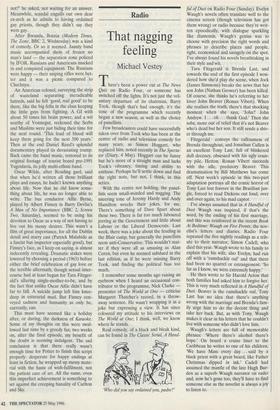Radio
That nagging feeling
MIchael Vestey
There's been a power cut at The News Quiz on Radio Four, or someone has switched off the lights. It's not just the vol- untary departure of its chairman, Barry Took, though that's bad enough, it's the tone of the programme which recently began a new season, as well as the choice of panellists.
Few broadcasters could have successfully taken over from Took who has been at the centre of radio and television comedy for many years, as Simon Hoggart, who replaced him, noted recently in The Specta- tor (Diary, 4 May). Hoggart can be funny but he's more of a straight man and lacks Took's vibrancy, timing and ability to enthuse. Perhaps he'll settle down and find the right note, but not, I think, in this series.
With the centre not holding, the panel- lists seem small-minded and nagging. The sneering tone of Jeremy Hardy and Andy Hamilton wrecks their jokes, for me. There's something of Dave Spart about these two. There is far too much laboured jeering at the Government and little about Labour or the Liberal Democrats. Last week, there was a joke about the feuding in the Blair camp, but generally the panellists seem anti-Conservative. This wouldn't mat- ter if they were all as amusing as Alan Coren, but even he seemed subdued in the last edition, as if he were missing Barry Took, and finding the political bias too much.
I remember some months ago raising an eyebrow when I heard an occasional con- tributor to the programme, Nick Clarke — presenter of The World at One — criticise Margaret Thatcher's record, in a throw- away sentence. He wasn't wrapping it in a joke but expressing a view. It has since coloured my attitude to his interviews on The World at One; I think, well, we know where he stands.
Real comedy, of a black and bleak kind, can be found in The Classic Serial, A Hand- 'Who did you say ordained you, padre?' ful of Dust on Radio Four (Sunday). Evelyn Waugh's novels often translate well to the cinema screen (though television has got them wrong) or radio because they're writ- ten episodically, with dialogue sparkling like diamonds. Waugh's genius was to choose with precision the right words and phrases to describe places and people, tight, economical and savagely on the spot. I've always found his novels breathtaking in their style and wit.
Tara Fitzgerald is Brenda Last, and towards the end of the first episode I won- dered how she'd play the scene, when Jock (James Simmons) breaks the news that her son John (Nathan Grower) has been killed. Of course, she thinks he's referring to her lover John Beaver (Ronan Vibert). When she realises the truth, there's that shocking moment when she says, 'John? John Andrew. I ... oh ... thank God.' Then she sobs, more out of relief that it's not Beaver who's dead but her son. It still sends a shiv- er through me.
Fitzgerald conveys the callousness of Brenda throughout, and Jonathan Cullen is an excellent Tony Last, full of blinkered dull decency, obsessed with his ugly coun- try pile, Hetton. Ronan Vibert succeeds with the idle, predatory Beaver. This dramatisation by Bill Matthews has come off. Next week's episode in this two-part adaptation portrays all the comic horror of Tony Last lost forever in the Brazilian jun- gle, forced to read Dickens out loud, over and over again, to his mad captor.
I've always assumed that in A Handful of Dust Waugh was inspired, if that's the word, by the ending of his first marriage, and this was reinforced in the recent Book At Bedtime: Waugh on Five Fronts, the nov- elist's letters and diaries. Radio Four repeated the five nightly readings as a trib- ute to their narrator, Simon Cadell, who died this year. Waugh wrote to his family to explain that his wife, also Evelyn, had run off with a 'ramshackle oaf and that there had been no quarrel or estrangement. 'So far as I know, we were extremely happy.' He then wrote to Sir Harold Acton that both families had asked him to forgive her. This is very much reflected in A Handful of Dust. Beaver is the ramshackle oaf, Tony Last has no idea that there's anything wrong with the marriage and Brenda's fam- ily urge him to do the decent thing and take her back. But, as with Tony, Waugh makes it clear in his letters that he couldn't live with someone who didn't love him.
Waugh's letters are full of memorable phrases: 'Where there's alcohol there's hope.' On board a cruise liner to the Caribbean he writes to one of his children, 'We have Mass every day ... said by a black priest with a great beard, like Father Christmas dipped in ink.' Cadell had assumed the mantle of the late Hugh Bur- den as a superb Waugh narrator on radio and, now he's gone too, they'll have to find someone else as the novelist is always a joy to listen to.


























































 Previous page
Previous page